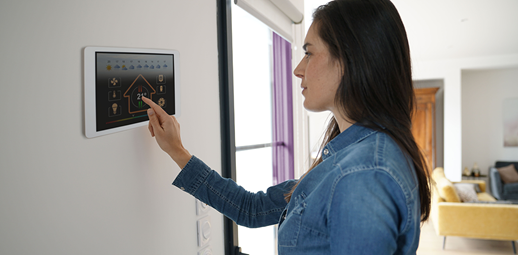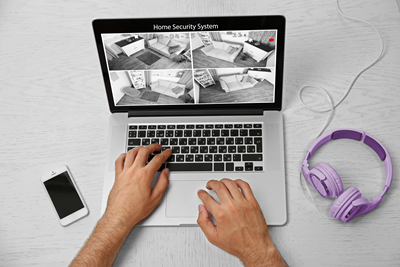
It doesn’t matter whether it’s food shopping or monitoring your sleep: chances are, there’s an app for that.
What’s more, smart technology is increasingly being used throughout the home for boosting security and lowering certain bills. But what does this technology mean for the price of your insurance, or premium, as it is known?
How does smart security work?
There are now plenty of smart security systems which make the most of technology to help keep your home safer. These cover things like smart doorbells, smart cameras and even smart locks.
These might include features like cameras allowing you to monitor who is at your door or around your property via your smartphone, no matter where you are. With a smart lock for example, you can gain access to the property using just your smartphone.
It’s not just security either
Of course, smart technology in the home stretches far beyond simply boosting your security.
For example, there is now a range of tools allowing you to monitor and adapt your property’s energy use, from the smart meters most suppliers are now rolling out, to smart thermostats which allow you to adapt the temperature of your property, wherever you are.
Not only can a smart energy system deliver lower energy bills, it may even result in avoiding making home insurance claims. One of the most common reasons for a claim against a home insurance policy is for escape of water, following a burst pipe - a smart energy system can help you keep your property at a decent temperature even when you aren’t there, reducing the chances of a burst pipe.
Along similar lines, there are now smart systems such as Homeserve’s Leakbot, which can be clipped to a water pipe and can detect leaks when they are still small and can be prevented from causing large amounts of damage.
Does a smart home mean a lower insurance premium?
When an insurer looks to price up your insurance, one of the big things they will look for is how secure the property is. The better the security features, the lower your premium is likely to be - that’s why you’ll have to answer questions about things like what locks you have on your windows and doors.
Having any form of additional security in place, whether it’s connected to the internet or not, will boost your chances of enjoying a cheaper premium. Of course, it’s unlikely that the savings on your home insurance will immediately cover the costs of having the security kit installed - if that system cost £500 for example, it may take a good few years to recoup that in insurance savings.
It’s important to remember that smart technology in the home is still a new thing. A report from Deloitte in 2016 found that just 3% of UK households have a smart security system, smart thermostat or smart lighting, with just 5% considering purchasing such a device.
As a result, there is limited data on how smart devices can help protect your home, so you should not take it for granted that having one installed will mean reduced insurance premiums, for now at least.
What about hackers?
While smart security systems are viewed as welcome progress in improving the safety of our homes, there remain some concerns about whether they may be susceptible to wily hackers.
Researchers at the University of Michigan reported in 2016 that they were able to hack into a smart lock by programming a new PIN, prompting the professor of electrical engineering and computer science, Atul Prakash, to warn that people should have “some pause when considering deploying these kinds of technologies” given the “potential vulnerabilities”.
However, the government has taken steps to push manufacturers of all smart devices to introduce much more stringent security measures against the threat of hackers in its Secure by Design review, which was developed in collaboration with the National Cyber Security Centre.
These includes measures like ensuring that sensitive data which is transmitted over apps is encrypted and automatic software updates.
System drop-outs
There are also understandable concerns about what happens if the security system goes down entirely. It’s bad enough when the broadband drops out and you can’t stream something from Netflix, but when that system issue is impacting your home’s security, the consequences can be far more serious.
Earlier this year the NEST smart home system unexpectedly went offline for around three hours, causing issues with everything from door locking to managing the property’s temperature with the thermostat.
Evidently, while making your home smart can help boost its safety when everything is working properly - and potentially result in savings on your home insurance premiums - should that system drop out then you’ll have to rely on the more old-fashioned security measures you have in place.


